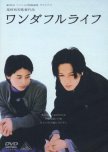
Reviewing A Classic In Retrospect; Kore-eda’s Philosophical Experiment…
Looking back in retrospect ‘ After Life’ ( 1999) is one of those movies which few Asian film enthusiasts know about unless they’ve been told or stumbled upon it before. Admittedly it’s understandable as to why ‘ After Life’ is often buried in the past- it’s heavy-going and arguably slightly dated within its filming techniques and appearances, but there’s also something oddly distinctive about director Kore-eda's approach to the movie.
The premise is simple enough: what happens after death. However contrary to a heavenly or a hellish after place which exists in so many other religions, Kore-eda a takes a visionary approach to the afterlife where the dead stay in a house for a week and are given the choice to hold onto one memory out of all others to preserve as they enter the afterlife. Over the film’s duration length capturing just one week in this mystical plane, 22 recently deceased mortals visit the lodge each with their own stories to tell and problems to face.
Kore-eda recalled that during the screenwriting process he was inspired by the crucial importance of memories during the onset of his grandfather’s Alzheimer’s, leading him to become curious about ideologies and views of individuals. This process led him to interview reportedly more than 500 individuals about their experiences and which are embellished throughout the film.
However whilst the storylines present interesting food for thought from a teenage girl who wants to relive her experiences at Disneyland ( before choosing something more personal after an epiphany), an old libertine who decided to choose a surprisingly sentimental memory and others choosing simple daily pleasures ( such as a bus ride) in different seasons, ‘ After Life’ often struggled to tackle these experiences in more sentimental depth. This is mainly because whilst there are many intriguing characters, there’s little time to actually give them screen time to be explored more thoroughly.
Throughout the duration of the move there are only three characters onscreen to be given dominant screen time; Ichiro Watanabe (Taketoshi Naito), a 70-year old businessman who died in the wake of an unsatisfactory life of menial work , and his afterlife guardians , Takashi Mochizuki (Arata) and Shiori Satonaka (Erika Oda). Whilst later revelations provide a climatic ( and then anti- climatic) revelation towards a shared link between Takashi and Watanabe, the build-up and resolution often lacked a more intriguing drive to viewers due to its slow pacing being intertwined with its shared other residents onscreen .
Of course this isn’t to bring down ‘ After Life’ entirely as in addition to its more philosophical and profound themes found in the storyline, Kore-eda is a masterful planner with the film’s cinematography also. Enlisting the talents of Yamazaki Yutaka ( who had previously won awards for his artistic filming in documentaries) through shooting on a 16 mm film as well as famous photographer Sukita Masayoshi in flashback sequences through a 8 mm, and 16 mm film in monochrome, ‘ After Life’ is visually memorable. Minimalistic filming techniques of snow, long empty halls and unoccupied rooms present a great contrast to the clever representation of the modern Japanese way station through limbo to the afterlife ; a reflection of the inescapable and fascinating mundane reality of the afterlife. Just as the rest of the film offers profound moments and should be counted by interpretation, the ending offers a reflective experience also.
So what is left to take from ‘ After Life’ ; is it a movie worth watching or is is overly dull and pretentious? ‘ After Life’ is a movie which even for the most erudite viewer is borderline mind-numbing at times with slow burn dialogue and cinematography dominating screen time. Of course this isn’t to say that the film is bad or unwatchable. Director Kore-eda’s imagination is reflected throughout the film’s palettes and concept, with poignancy reflected in each memory, as well as deeper questioning as revelations to come light. By far more intriguing food for thought than entertaining or exhilarating, ‘ After Life’ is not an easygoing movie and will likely not be to everyone’s personal tastes or likes. However those willing to delve into the film’s philosophical experiments and experience, will likely commend the film for being an intriguing piece of Japanese film history.
Was this review helpful to you?
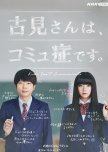
Your Lighthearted Manga-Adapted Setup…
As a premise ‘ Komi-San Can’t Communicate’ ( alternatively known as Komi-San Wa, Komuyoshu Desu’ or ‘ 古見さんは、コミュ症です。’ ) is a fairly heartwarming setup. Based upon the manga of the same name, having spawned an anime also and adapted to the small screen by screenwriter Mizuhashi Fumie, ‘ Komi-San Can’t Communicate’ tells the tale of a high school student who aims to be “ average” , Tadono Hitohito ( played in the drama by Masuda Takahisa), who ends up unusually befriending popular girl Komi Shouko ( Ikeda Elaiza). Despite appearances, Komi struggles with verbal communication and therefore due to having select mutism, has to write down everything she wants to say on a notepad. She enlists the help of Tadono to help her make her goal of having 100 friends ( due to having none) a reality.
However with a sweet and heartwarming premise and more than 23 volumes of manga to execute into a space of eight episodes, it was evident that Mizuhashi would be very restricted towards which storyline elements to follow and cut out. On the other hand even with its short duration length, ‘ Komi-San Can’t Communicate’ often felt as though it missed out on more nuanced opportunities to explore characters, relationships and also plot without having to lean heavily upon certain tropes and comedy in between.
As far as the acting is concerned ‘ Komi-San Can’t Communicate’ is admittedly a mixed-bag. Of course this isn’t to downgrade the actors themselves as individuals, but their performances and line deliverances could admittedly come across as slightly over-the-top and exaggerated rather than feeling comically-timed or dynamic. ( Naturally this is also down to the problem of the script’s dialogue also.)
The characters are specifically there to serve a purpose throughout the show and this does come off with differing results. As the main lead Tadono Hitohito is arguably a slight anomaly; whilst the drama ( similar to previous counterparts) uses his surname for comical motives ( I.e. Hitohito being taken from the Japanese expression;” tada no hito (ただの人)”, meaning “just some guy”) , he is undeniably an intriguing character ( against his own motives). Tadono embodied a trait which is often overlooked in male leads and that is empathy. The male lead can
read people like a book giving him a sweeter note and pick up on Komi- San’s feelings easily.. However instead of presenting the “ inner Tadono” for comical scenes to voice his inner-thoughts and feelings, Tadono lacked a lot more character drive than his previous counterparts. Whilst it was played off for a comical reason it felt odd that the drama didn’t touch upon the reasons behind his choice to become “ normal” as well as his family. Even touching upon these motives and characters briefly would’ve given Hitohito a sense of being more than just a plot device to keep the storyline moving alongside his “ potential chemistry” with Komi.
The romantic factor between both characters is admittedly more “ hinted at” throughout the show than prominent.
Then of course there’s Komi Shouko. Shouko is a really sweet female lead and stands out against the typical two tropes of being “ aloof and cold” as well as “ loud and vivacious” by her introverted nature and social embarrassment. Her ability to make unlikely friendships with Hitohito alongside kindhearted and lonely gyaru Manbagi Rumiko( Yoshikawa Ai) did seem to prove that her intentions were good. However similar to Tadono, Komi often struggled with having more subtle character background. For example there’s the issue with Shouko being perceived as “popular”. Whilst it may have come across as Shouko being “ unapproachable” and “ pretty”, this also raises questions as to how Shouko did not isolate herself socially, or became a victim of bullying by standing out. Naturally whilst it is based upon a manga and more exaggerated tropes are executed into reality, it felt odd we weren’t given opportunities to explore more about how she’s perceived as being popular, Shouko’s reasons for not talking as well as any possible links to her childhood or family interactions to provide clues.
The comedy in the show is admittedly over-the-top. Whilst this isn’t entirely bad per say and the drama does odd a surprisingly lighthearted and sweet moment between Hitohito and Katai Makoto ( Mizobata Junpei- who is cut out of the show after his initial use) ‘s friendship, as well as the attempted “ cool” persona put on by his replacement Naruse Shisuto ( Shirota Yu), it’s easy to understand how this may not appeal to everyone, as more subtle and intertwined comedy is often less common to find throughout the drama.
The ending admittedly has its flaws and strengths also; whilst it did add a sweeter note and help to clarify something important for Komi, it left off with more questions than answers. Of course cliffhangers aren’t necessarily bad per say in dramas, but the abruptness of this ending without wrapping up our other side characters felt a little odd and lacking within character direction.
So is ‘ Komi-Sam Can’t Communicate’ actually worth watching or should you just skip it? The acting front admittedly isn’t the strongest and whilst respectfully members of the cast have had better performances, it doesn’t necessarily take away from the fact that the drama is sweet and lighthearted. The basic trope executed of “ high school friendship tale” isn’t necessarily original, however, characters do surprisingly grow on you throughout the show. Admittedly a lot of these characters alongside the comedy and due to air time often felt a little bland with those expecting a dynamic love story between Komi and Tadono possibly being disappointed. On the other hand for those just wanting a drama in order to cheer-up or looking for something to quickly binge-watch, then ‘ Komi-San Can’t Communicate’ is worth watching.
Was this review helpful to you?
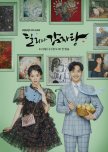
In between raving hype surrounding the main cast and the plot, screenwriter Son Eun Hye’s ‘Dali And The Cocky Prince’ has erupted quite a stir amongst avid drama watchers praising the series as ‘’dynamic’’ and ‘’fresh’’. However, this boils down one ultimate question; “Is ‘Dali And The Cocky Prince’ actually worth watching, or is it a classic case of an over-hyped production?”
The series applies the basic romantic comedy formula of ‘’ opposites attract’’; Moo Hak( Kim Min Jae) is a confident and nouveau riche social-climber, whilst Kim Da Li (Park Gyu Young) was born into “ old money” and is a naturally talented art exhibitor and critic . During a trip to an art exhibition in the Netherlands Da Li and Moo Hak end up encountering one another for the first time . Soon afterwards Da Li finds herself struggling to keep her art gallery afloat and consequently through several setups become indebted to Moo Hak. However (typical of romantic cliches) Moo Hak and Da Li begin to fall in love…
One of the greatest strengths of ‘ Dali And The Cocky Prince’ comes through Kim Min Jae and Park Gyu Young’s onscreen chemistry. In between some of the more questionable line deliverances at times Min Jae and Gyu Young’s pairing was dynamic and fun, but ( playing to the drama’s strengths and downfall as a consequence of testing viewers’ attention spans) slow-burn.
Actress Park Gyu Young’s performance and stylist helped to convey a sweet and charismatic charm surrounding the female lead. Da Li is refreshingly not your typical ‘’spoilt princess’’ female lead archetype. She is kind-hearted, an afficionado of Modigliani and has a natural artistic flare which has long been nurtured by her parents ( her namesake evidently being famous Spanish surrealist painter Salvador Dali), but as a child of a prestigious family, she often finds herself lost in cloud cuckoo land when dilemmas regarding the museum are raised. Whilst aspects of Kim Da Li’s past and background help to explore her character in more depth and do help to present her goals, personality and motives, Da Li undeniably did often feel shoehorned into the role of the ‘’ victim’’. (Especially in later episodes as more revelations come to light.)
Of course, the ‘’victim’’ trope isn’t always necessarily a bad thing in a series. It can help to explore characters in more depth and it did present some more raw moments for otherwise seemingly impeccable characters. For example Da Li is not truly made aware of her attempts to bury her head in the sand until Mu Hak acts as her personal anchor to ground her back to reality. However, whilst praise must be given to presenting Da Li as someone who gradually faces reality with grace and charisma, it seemed odd that the series didn’t present more opportunities for the female lead to take her first steps through more independence and personal growth rather than being enforced into the role for the “ sake of plot tension”.
Of course this naturally brings us onto our second topic of debate; male lead Jin Moo Hak. Expected of his namesake from the title Moo Hak has become accustomed to a wealthy of hedonism and money since his tiny family run-restaurant turned into an international food conglomerate through successful business ventures. Kim Min Jae walks onscreen with an air resonating Jay Gatsby; gaudy suits, satisfaction over materialistic purchases and truly buying into his own ideology that money can truly buy love and happiness.
Moo Hak is arguably the perfect foil and counterpart to Dali; arrogant, haughty and overly confident (which both provides to his advantage and lands him in hot water throughout the drama) but not without his more “ redeeming” character traits either. For example Moo Hak is undeniably a hardworking and charismatic entrepreneur, as well as gradually more empathic as he comes to see ( from Dali) the importance of genuine and authentic relationships that money cannot buy. On the other hand Moo Hak ( similar to the female lead) is very much enforced throughout the series as a plot device; existing to create a splash of tension and jealousy to keep their potential romance “ interesting”, but often dismissing more intriguing elements of Moo Hak’s journey and success along the way.
‘ Dali And The Cocky Prince’ really did not shy away from reimbursing all the overused tropes and cliches you’ve seen before from the “ foreigners” to the the infamous “ drunken escapades of your main character”, “ mistaken identity” and even the “ shower scene” find their ways multiple times throughout the drama.
However one dreaded creme de la creme of cliches which appeared in the storyline occurred through the issue of the “ love triangle” setup between Moo Hak, Da Li and her “first love” second main lead Tae Jin ( Kwan Yool). In the expected setup that you can imagine, Tae Jin and Da Li ended their relationship on an “awkward note”. (Pining and unrequited love ensues for Tae Jin as the “ impartial female lead” is milked by screenwriter Eun Hye throughout the subplot.) Then to add the cherry on top of “ tension for the sake of tension” there’s also the unrequited feelings ( which are often played for comical foil than actual heartache) of Ahn Chak Hee ( Yeonwoo) who often “bickers” with Moo Hak over her feelings for him and leading to numerous comical misunderstandings.
Thankfully Eun Hye only added these “ tropes ” as a side storyline with an major plot shift to a “ thriller mystery” subplot soon taking frontal stage as the focal point of the drama. In between these scenes there’s a notable shift on other characters unexplored in this latter half.
For example there’s supporting character Won Tak ( Hwang Hee) who is a hardworking police officer with a sibling like relationship with Dali, and Moo Tak’s quirky secretary Yeo Mi Ri ( Hwang Bo Ra). Whilst admittedly both characters were often the root of “ plot motivation” or “ comical foil”, they admittedly did add a sweeter note to the darker subject areas of the drama.
Then of course there’s the last topic surrounding director Lee Jung Sub’s take on the cinematography. Whilst honestly it did feel as though Jung Sub had some more evident missed opportunities with playing with the artistic creativity of the plot, there were admittedly some brilliant scenes and aesthetics carried through adding a warm palette to the romantic-comedy. The ending was admittedly trope-induced; not bad per say, but lacking more fluid coherency towards the characters’ own choices and decisions in the final act.
So what’s left to say about ‘ Dali And The Cocky Prince’ ? Is it worth watching or is it an “overhyped” drama? The biggest thing to say about the rom-com is that the drama accommodates from lighthearted to more serious to suddenly lighthearted again, and isn’t afraid to interplay the cinematography more subtly with this.Our main leads had good chemistry and it was surprisingly sweet to see the “ polar opposite” trope executed once more. On the other ‘ Dali And The Cocky Prince’ isn’t an inherently original or brand new concept with tropes and cliches often weighing down more intriguing story elements, characters and even the ending (to a certain extent). The drama isn’t entirely “ original ” as a consequence of this screenwriting decision and whilst the comedy may vary for viewers, the drama is certainly a decent and sweet enough rom-com.
Was this review helpful to you?
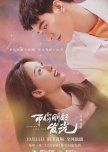
A Drama Which Certainly Doesn’t Have A “ Shining” Charm…
‘ Shining Like You’ is one of those dramas which upon paper sounds brilliant. It isn’t particularly original concept of “female lead goes to art school behind her parents’ back” and the “potentially handsome love interests” but there was still a lot of unlimited ground to explore messages, character growth and social themes. However the end result of ‘ Shining Like You’ is a mixed bag of wasted screenwriting and character writing potential with poor-editing and a discordant buildup.
On a positive note the acting is decent enough ( aside from a few questionable line deliverances) and the drama is a fairly lighthearted watch. The premise isn’t overly complex and follows typically obsequious lead Lu Qi Yi ( Wang Xi Xuan) rebelling against the wishes of her parents to attend a course in foreign languages at university by instead enrolling in arts school. However due to her more timid nature Qi Yi soon finds herself an outcast by struggling to fit in amongst the more expressive and extroverted personalities on campus. After an initial awkward meeting Qi Yi soon attracts the attention of outgoing and popular art student Fang Yan ( Simon Gong).
So if the concept and the acting aren’t the drama’s major problems then what exactly lets down ‘ Shining Like You’? Ultimately the downfall for the show can be found through two main factors; character writing (one of the drama’s major cataclysmic letdowns) and of course plot coherency. To address the former issue it is important to establish that plot coherency is crucial within dramas for viewers to make sense often of a storyline or setup . Of course sometimes screenwriters can purposefully make plot coherency more enigmatic for viewers with the intention of reflecting themes or messages ( dependent on the plot or storyline ). However , in “ typical” romance dramas such as ‘ Shining Like You’’s plot coherency is nearly always quintessential to helping viewers root for certain characters, understand developments of relationships and keep us intrigued with events that are soon to follow .
Naturally ‘ Shining Like You’ isn’t devoid of a basic plot but its descent can be found as a consequence of a mismatched narrative and timeline as a consequence of sporadic subplots , arbitrary jump scenes and disjointed patchy editing. As a consequence a quintessential moment could suddenly be skipped by a sketch scene or an arbitrary moment, which became confusing for casual and devoted watchers alike to keep up.
This brings us onto the second dilemma of ‘ Shining Like You’; the characters. One of the biggest elephants in the room is evidently our female lead Qi Yi. Our main female lead is the epitome of a carte blanche female lead. She’s used by the screenwriter to move the plot along when necessary but she rarely has more definitive characteristics or traits to make her feel sentient. For example considering that it was one of the major focal points of the entire drama, there’s little explanation or depth given to her her goals or raison d’être for applying to the arts school in the first place . Arguably she does make a quick passing comment towards “chasing her dreams” yet it’s hard to really understand or relate to Qi Yi’s drive or exact motives for hiding her attendance from her parents, when the drama has rarely delved beyond the surface of her goals, past or exact motivations.
There’s naturally a big dilemma with the female lead’s “ personality” also. Qi Yi is intentionally supposed to be an “ introvert” but it often felt as though the series was never sure how to present her entire character persona. Introverted main characters can often be tackled in versatile ways by screenwriters from being simply “reserved” to “antisocial”, but opportunities for characters to grow, develop (or at least be explored in more depth) are often key to shaping out an introverted main character as an individual.
To some extent ‘ Shining Like You’ desperately tried to do this with Qi Yi and her “ difficultly to fit in” and “ reserved nature”. She’s supposed to be “shy and sweet” but it was hard to truly feel as though our female lead was seemingly struggling or suffering as a consequence of her personality. Qi Yi was often surrounded by allies or at least close acquaintances and therefore never really felt on the “ edge” of social exclusion ( as the series was desperately trying to make out in the beginning ), she was never really singled-out or excluded particularly by a greater majority of her peers( sans the cliche “ bully group” who picked upon more than just Qi Yi) and when she did exhibit “ antisocial” moments during the series her attitude was often petulant and childlike rather than moody or aggressive. Whilst the drama does try to offer a turn around by Qi Yi suddenly becoming “ prettier and more outgoing” , this was often ineffably unexplained.
Perhaps it wouldn’t be too bad if the series had offered that Qi Yi’s immaturity at times was a byproduct of the way her parents have treated her or her upbringing . However instead of at least giving Qi Yi time to mature or explore her feelings, the female lead was treated in a similar manner to a rag doll ; an object of affection for the male leads , whilst happily obliging to having her emotions torn apart by not just her potential love interests, but not putting her foot down against a fake friend in plain sight also.
This also brings us naturally onto the discussion of side characters in the drama. On one note the show does really shine through at times with how more unlikely characters have difficult pasts or can prove themselves to be true friends in time of need. However like a lot of cliche romance dramas ‘ Shine Like You’ and the dreaded “ best friends formula” is torn apart from “ friends to enemies” with the creme de la creme of cliches; “the dreaded love triangle”.
This brings us onto one of the biggest flaws of the drama between the actual lacklustre romantic series between Qi Yi and Fang Yan. Respectfully the chemistry between Wang Xi Xuan and Simon Gong is hardly passionate, but it is not where the major flaw of the series lies .
Whilst trope-worthy, screenwriters and directors can often strike gold by using time and scenes to allow characters to know one another or feel conflicted with their feelings. In ‘ Shining Like You’ it’s hard to really define one particular moment where these two characters really develop their relationship beyond being classmates or having early impressions of one another. There’s the evident side argument about their gradual feelings and helping one another out when it was necessary for the exposition, but this rarely allowed for more definitive writing opportunities.
Consequently it was bitterly ironic that it is was easier to root for who we were supposed to “ dislike” (as viewers), second male lead Du Ang ( Zhou Cheng Ao) , as he had more initial interactions and chemistry with the female lead. Of course rather than using this as an opportunity for the series to allow the male lead to come to terms with his own feelings or develop interactions between the main love interests, the drama enjoys using this time to make Fang Yan the typical “ moody, short-tempered and jealous potential love interest”. The ending consequently felt disappointing by failing to wrap up some major plot points.
So what is the ultimate takeaway from ‘ Shining Like You’ and is it actually worth watching? ‘ Shining Like You’ tries hard to create a “ lovely and cutesy love story” between our main leads. To an extent the series flourishes with satisfactory performances by our main cast and some more insightful side characters having their own backgrounds and pasts. On the other hand the series has a patchwork approach to storytelling and narrative with a feeling of discordant coherency between characters and the actual storyline. Slow pacing and sporadic plot jumps lead to poor and lacklustre character building and interactions between our main leads. Ultimately whilst ‘ Shining Like You’ might not make a bad binge-watch drama, there are certainly more entertaining, well-written, engaging and classic love stories in dramas to watch than this one.
Was this review helpful to you?
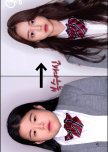
Poorly Executed Or Well-Written?; What’s Left To Say About ‘ A Beauty Of Revenge’ …
With a very short air time ( only five episodes), and an evidently cut duration length and budget by the producers of the fairly mixed-reception miniseries ‘ Multi Personality Girl’ ( the drama’s “ sister story”) , ‘ A Beauty Of Revenge’ was fairly predestined from the start towards having some evident flaws . However with its own take upon the “ revenge” cliche and incoherent plot twists in between, this does leave newcomers with one ultimate question; “is ‘ A Beauty Of Revenge’ actually worth watching? “
The drama’s initial premise was certainly interesting; a bullied girl Min Sun ( Park Min Sun) seems to change her appearance and identity to become Yeo Bin ( Jang Yeo Bin) and expose the sociopathic delinquent leader Ho Tae ( Son Ho Tae) as part of her revenge ploy.
The acting front of the drama was fairly good . Whilst admittedly certain line deliverances could be better than others, our main cast did add their own dynamic charm during key moments throughout the series. Yeo Bin’s darker secrets coming to light and her unreliability as a main character added a value of surprise for audiences by Jang Yeo Bin’s mannerisms captivating a sense of trust and believability within the female lead. Similarly Ho Tae’s sociopathic and megalomaniacal actions onscreen were captivated well by Son Ho Tae’s piercing gaze and sardonic expressions .
On the other hand ‘ A Beauty Of Revenge’ seemed to try too hard (even from the get-go )to brand itself as a “ shocking revenge tale” without always taking the time for the audience (and even the characters) to digest or understand the plot twists . For example there’s a major plot twist ( without spoilers) which occurs in the drama which whilst surprising , felt poorly-executed and lacked more drive and coherent plot reasoning .
In fact this was a major problem in the miniseries. Whilst it’s short duration length is arguably a pitfall for not having opportunities to expand out on these storylines in more depth, it’s undeniable that it doesn’t take a lot of time to interweave good writing techniques. ( One of the most evident throughout being foreshadowing. )As a consequence whilst the ending was certainly unforeseen, it lacked as much shock value due to feeling poorly-paced.
Ultimately with its short duration length episodes ‘ A Beauty of Revenge’ is easy enough to watch in one binge-watch sitting. Whilst the concept and of course the cast were undeniably the miniseries’ major fortes, the execution of storyline and plot twists lacked more finesse.
Was this review helpful to you?
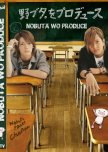
‘ My Fair Lady’ Meets Japanese Idol Culture…
‘ Nobuta Wo Produce’ is a drama which has long had a love-hate relationship with J-drama fans; some loving the sweet and sentimental revamp tale of “shy girl” Nobuta (Horikita Maki) unlikely befriending
popular guys Kiritani Shuji (Kamenashi Kazuya) and Kusano Akira (Yamapi) in order to get a makeover and become popular, others seeing the drama as just cliche and prosaic. However this leaves newcomers who have stumbled across the drama with one question;” is ‘ Nobuta Wa Produce’ actually worth watching ?”
Arguably one of the winning strengths of the short drama is the acting front. Horitika Maki, Kamenashi Kazuha and of course Yamapi had brilliant and nuanced touches to their mannerisms as their onscreen personas and dynamic chemistry.
As far as the storyline goes there’s a mixed-bag of screenwriting techniques used. On a positive note the drama sometimes did present some more profound messages against its superficial setup; Nobuta’s “ makeover” didn’t press an immediate reset button on how other perceive her or her popularity ( as often showed in the “ magical makeover” trope), but rather gave others over the course of the drama the opportunity to understand the female lead’s unique personality traits.
Similarly unlikely popular main lead Shuji had his reflected insecurities over the course of the storyline. He was often scared of being rejected and often self-conscious about revealing his true self to others until he begins to open up around Nobuta and Akira.
As a consequence of the storyline focusing on high school a lot of the carried themes shown throughout the drama revolved around the “ high school experience” with certain poignancy in the reflected themes, personas and relationships of teens onscreen.
However whilst the drama undeniably had its highs during these moments in the first-half, the second-half lost the series’ true screenwriting momentum . The plot began to rest heavily upon poorly-executed tropes ( including the “ sabotage” cliche) in order to keep the plot moving rather than truly engaging the audience . Characters such as Akira( the fun loving “ jokester” character who felt as though he’d have his key moment to shine like Nobuta and Shuji), fell flat in seconds flat by having little development aside from plot “ tension” ( when it was called for) and to keep the storyline “ lighthearted”.
This is also pointed out a major problem with the second-half failing to seek a sense of dynamic build between our main characters’ friendship; the main goal being simply “ Nobuta’s makeover” lacked a lot of build and connection chemistry. Whilst this did improve over episodes ( and was sweet at times) , it still lacked an extra spark as a consequence of poor build-up.
Then of course there’s the dramatic shift with Shuji and Akira’s “ romantic feelings” for Nobuta. Whilst the romance was arguably necessary to “ spice up the drama”, it was prosaic and meaningless in a drama where the focal foundation of the setup is about friendship. Arguably whilst it was easy to see some connection between Nobuta and Shuji’s onscreen “ potential romance” due to their differing yet “complex” experiences, nothing was ever really solved or explored further between the two. (Questioning as to why it was put forward in the first place.) To add more fuel to the fire there’s also the issue of Akira’s “ crush” on Nobuta. Whilst it wouldn’t have been too bad if there had been a define explanation to Akira’s feelings or this had been carried further, it provided to never brought up again or carried over after its initial use.
The ending of ‘ Nobuta Wo Produce’ has undeniably left viewers indecisive. Admittedly whilst the show does give an appropriate finale and conclusion for Nobuta, there was little to really subside the drama from crumbling away from its initial foundations of a strong friendship between the main characters.
Overall ‘ Nobuta Wo Produce’ was not unwatchable. Despite false appearances against the “ outdated” idol-style haircuts and popular culture tropes, the acting front was fairly good here and the drama did presents some subtly powerful messages about adolescence. On the other hand a major proportion of the drama was overshadowed by the poor execution of the second-half with character arcs feeling rushed and unfinished and tropes and cliches often ruining more profound moments or messages. A decent binge-watch for anyone in the mood for a lighthearted series, but admittedly lacking more coherent structural writing and execution.
Was this review helpful to you?

A Tale Which Tries To Warm Your Soul…
‘ Coffee Ikaga Deshou’ ( alternatively translated as ‘ How About A Coffee?’) is one of those dramas which will likely remain under the radar for most drama watchers. Based upon the manga of the same name and Adapted to the small screen by screenwriter and director Ogigami Naoko alongside co-director Mori Yoshitaka, ‘ Coffee Ikaga Deshou’ ‘s plot isn’t complex.
Admittedly ‘ Coffee Ikaga Denshou’ isn’t an overly original concept. Main lead and arcane barista and coffee van owner Hajime Aoyama ( played brilliantly by Tomoya Nakamura) comes across in a similar suave and mysterious manner as the “ mysterious flaneur figure” Izakaya owner from ‘ Midnight Diner’.
However on a virtuous note Coffee Ikaga Denshou’ ‘s plot was fairly driven by its prominent messages during most of the series. From dealing with issues such as struggling to fit in the status quo, disillusionment, popularity and grief, most episodes had something fairly
poignant to address about Japanese society and everyday life.
Yet unlike the reoccurring characters of ‘ Midnight Diner’ who were left only to piece together parts of the owner’s past, Aoyama’s link to his backstory as well as his reasons for becoming a coffee connoisseur, played a more “ pivotal role” within the events of the series. The main driving force behind the " tension" of the plot evidently occurred within the interwoven backdrop of each episode focusing upon surrounding the reoccurring onscreen appearance of the mysterious gangster ( Isomura Hayato) who was hunting down Aoyama for unknown reasons .
There’s a lot to discuss about how the series dealt with Aoyama’s character arc. On a positive note playing upon the storyline of Aoyama’s " secrecy being hidden in plain sight" made him an enticing character to learn more about and when his past was revealed it did present a lot of surprising revelations about our main lead. However Aoyama’s transition between his past persona and his current-self rarely felt more subtle or blurred, whilst his journey and struggles to kick past habits ( unless it was necessary for " dramatic tension") often felt disengaged from the storyline.
Due to the change and swap-up of characters during episodes it’s hard to pick out a multitude of characters to analyse in more depth. However due to their reoccurring appearances it is important to discuss ( without spoilers) about how the series dealt with the mysterious gangster Pei and his character arc alongside Shima Kakine ( Kaho)-the first customer to be shown to be served by Aoyama onscreen- and our " final major antagonist”.
Speaking about the latter character Pei’s initial raison d’être is acting as an antagonistic force within the drama by hunting down Aoyama for unspecified goals. However whilst it was undeniably sweet to see Pei have his moment of redemption through his later actions and decisions, the build-up of Pei’s actual character redemption arc often felt sporadic. Of course whilst the drama did drop hints towards Pei’s own personal connections, this rarely felt more built up or more widely interwoven with with Aoyama’s own character arc also.
Then of course there’s Kakine. Kakine is an odd character to discuss as
after her initial appearance in the first episode, her character doesn’t appear again until the last few episodes when the final storyline kicks in. Whilst Kakine is undeniably kindhearted by acting as the stereotypical " moral cheerleader" figure during the later storyline, she’s a character who felt the most paradoxical due to how the series approached her character. To explain this further it is important to point out that Pei initially commented during one of his first interactions with Kakine that she was annoying as she was " boring and dull". However during the first episode one of her major problems throughout the storyline of this episode was her inability to truly fit in at work. It seems an evidently nuanced point and whilst it is correct to assume perhaps from Pei’s perspective, Kakine is boring as she isn’t cut from the same cloth, it seemed an odd point not to expand upon Kakine’s own feelings and thoughts after this initial interaction. Whilst it is evident that perhaps the series didn’t have enough time to focus upon Kakine’s expanded feelings during this episode, it felt a wasted opportunity not to have used more the to have explored Kakine’s feelings, her previous struggled as well as her desire to make a good cup of coffee after her initial meeting with Aoyama.
Last but not least is evidently our " major antagonist" of the series. Now without giving too much away about the plot, our antagonist has their own personal reasons for standing in Aoyama’s way as well as their own screen time to explore their moments of humanity also. On the other hand their character introduction and build-up felt rushed and lacklustre . Whilst it is understandable that the series wanted to keep us in the dark for as long as possible about their identity, it felt slightly odd that the series didn’t try to foreshadow their character introduction or at least their presence in the series as opposed to a quick " climatic turn of events". As a consequence whilst the first half of the series thrived with strong plot messages and mystery, the second- half( whilst presenting more revelations) did seem to struggle with conveying the same ambience of charisma and strong screenwriting .
So is ‘ Coffee Ikaga Denshou’ actually worth watching? Whilst the acting front is fairly decent ( sans from a few awkward line deliverances) and the drama offers an interesting array of characters, main lead Aoyama undeniably has his own peculiar charm over audiences to keep them watching. Each episode offers the formulaic tale of a new issue or message during the first-half of the series and a melodramatic plot climax and revelation during the final part. The end result of eight episodes stringing out a lacklustre climatic buildup will undeniably leave viewers with mixed feelings.
Was this review helpful to you?
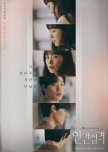
Is This Worth Watching, Or Is It A “ Lost” Cause?
Screenwriter Kim Ji Hye’s ‘ Lost’ is an odd-fusion melodrama which both feels old-fashioned within its dated outfit choices, haircuts, over-the-top scenarios and dialogue as well as surprisingly boasting an array of well-crafted main characters. However for newcomers or those merely wanting to pick up ‘ Lost’ this leaves us on an ultimate decision; “Is ‘ Lost’ actually worth investing more than sixteen hours into?”To cut it to the chase the premise of ‘ Lost’ mainly revolves around Lee Boo Jung ( Jeon Do Yeon) a 40-year old writer stuck in an unhappy marriage with her husband Jin Jung Soo ( Park Byung Eun) who has finally hit a rut in reality by realising that she has not truly achieving or accomplished anything in life . By a whim of fate she ends up encountering someone from a different walk of life, jaded 27 year-old Lee Kang Jae ( Ryu Joon Yeol) who fears for what the future may hold due to his complicated past .
One of the strongest gaining factors for ‘ Lost’ was the casting choice . Admittedly whilst the acting can dip a little at times with certain line deliverances, the main cast immediately help to convey something worth watching. Actress Do Yeon was brilliant as Boo Jung playing the role with a level of complex heartache and angst. Her micro expressions throughout the series captivated all of Jung’s emotions flawlessly and helped to make her onscreen chemistry with her costars believable.
Parallel to Do Yeon was evidently younger costar Ryu Joon Yeol who played his role as Kang Jae with a swift touch of moodiness and arcane mystery. As their onscreen personas Do Yeon and Kang Jae’s chemistry is undeniably slow-burn and well-built up, however, this is also undeniably thanks to screenwriter Kim Ji Hye and directors Hur Jin Ho and Park Hong Soo’s approach to the relationship. Rather than enforcing the typical traits of a lusty affair filled with dirty secrets and dramatic sneak out scenes, both characters’ gradual chemistry was surprisingly refreshing . Admittedly the slow-burn approach could work at a snail pace at times but the ability to see both leads reach out through getting to know one another through their deal( as well as having time to talk about their own feelings) offered surprising relief .
One of screenwriter Ji Hye’s major fortes came through approaches to character writing and interactions throughout the show. Whilst certain character did feel more antagonistic for plot-drive than motives, even these individuals were rarely pinpointed as “ villains” by having their own moments of humanity, flaws and strengths.
Ji Hye even took time away from our main couple to focus on an unlikely relationship between Boo Jung’s somewhat staid husband Jung Soo and his rekindled feelings for his old crush Kyung Eun( Kim Hyo Jin).
Yet ‘ Lost’ is evidently not without its more problematic writing flaws. The drama whilst having an intriguing setup is incredibly slow-paced and takes awhile to really build-up more dramatic momentum . Of course some of this is necessary to build plot, however, the storyline also failed sometimes to reach climatic tension or build-up during entire montages and even entire episodes due to being more focused upon very nuanced details rather than keeping the plot moving more actively .
In addition to this there’s also the problem with the over-the-top cliches. Whilst tropes can be fun and intriguing to see how a screenwriter revamps them and did work well to an extent in the setup of the drama, ‘ Lost’ ‘s usage of the tropes ( including the nearly-farcical cliche of the “ slap on the cheek”) often felt mismatched against the stronger and fresher writing attributes of character-build and relationship. The ending certainly matched the more profound writing moments of the series- bittersweet and interpretative, yet oddly appropriate.
Overall the viewing expectations for ‘ Lost’ is entirely dependent on what you’re looking for in a drama series. ‘ Lost’ embodies the classic tropes of a melodrama series from the overused tropes which lack more profound depth, to slow-paced story build-up in order to “ create slow burn tension ”. The acting front is undeniably one of the show’s winning strengths alongside the drama’s more original approach to the adulterous affair cliche. The directors carefully used an artistic touch to the moody and drab cinematography which symbiotically helped to reflect the tension and ambience of the plot. So is ‘ Lost’ actually worth watching? ‘ Lost’ is a drama which is dependent on your patience and tastes. Those looking for a more adrenaline-rushed and quick paced drama with flaring chemistry may be disappointed. However if you have patience and enjoy slow burn chemistry, then you’ll absolutely adore ‘ Lost’. Whilst not flawless this is undeniably one of 2021’s hidden gems.
Was this review helpful to you?

Revenge Is Sweet…
Screenwriter Kim Ba Da’s revenge-filled drama follows vengeful young woman Yoon Ji Woo ( Han So Hee) who seeks to find and bring to justice by hunting down the murderers of her father ( Yoon Gyung Hoo). Taking up another alias and infiltrating the police force as Oh Hye Jin , Ji Woo’s quest sends her down a dark road with many revelations coming to light.
Whilst the drama does present some prominent messages about corruption and morality both within South-Korean society, the justice system and the police force, the drama itself doesn’t really stray away from the stereotypical reaches of the “ revenge” drama, from Ji Woo’s experiences as an outcast teen to the “ murdered parent” trope soon taking central route before the actual zest of the revenge story crumbling slightly by the midway point . Of course this boils down to the ultimate question; “ is ‘ My Name’ actually worth watching or is it a waste of time?”
One of the strongest virtues of the series came through the acting front of our main cast. Main actress Han So Hee was undeniably dynamic as Ji Woo. Whilst the actress has respectfully formerly come under mixed reception for her role in the controversial Netflix flop ‘ Nevertheless’, Han So Hee reinstates any doubts within her moody, angst-driven and cunning onscreen persona as Ji Woo. As a character, our female lead has two different lives which are both intriguing as one another. On one side it’s easy to understand Ji Woo’s role early on in the series. She’s the “ outcast” and socially isolated from her peers due to her father’s criminal record and past. However refreshingly rather than presenting Ji Woo’s father as a “ heroic figure” in the eyes of a grieving Ji Woo, the series helps to explore more complicated depth to Ji Woo’s emotional state, as well as cunningness and stubborn to enlist help in unlikely places to reenact her revenge.
Helping her along the way comes the merciless and mysterious gangster played brilliantly by Park Hee Soon, Choi Moon Jin. Moon Jin acts both as a major mentor figure and an antagonistic plot foil for Ji Woo by helping to reinvent her identity as Hye Jin as well as hide his own personal motives also . He shares his own reasons for helping Hye Jin / Ji Woo but isn’t afraid to be more brutal or punish those who put a toe out of line.
As Hye Jin our female lead is a talented and a skilled police officer who over the years has not lost her raison d’être for revenge. Her partnership with fellow colleague and partner Jeon Pil Do( Ahn Bo Hyun) presents a great contrast between other relationships in the drama. Bo Hyun plays Pil Do with a laidback yet naturally driven charisma as a hardworking cop. Naturally as he spends more time with Hye Jin he becomes more curious about her identity and motives. Whilst a later plot development was supposed to present a “ moment we’ve all been waiting for” this undeniably felt lacklustre due to lacking screenwriting and bonding opportunities often made revelations between the fall short of plot drive.
Yet ‘ My Name’ isn’t without its more obvious problems either. Pacing could sometimes be a major downfall. Whilst a major drive was evident within Hye Jin/ Ji Woo’s search for her father’s killer, this major plot point felt often rammed into the storyline when it was necessary rather than flowing more coherently within the small subplots which followed in each episode. Evidently another major downfall as a consequence occurred within plot lore and logic with many setups (including early on) often falling short or lacking more depth due to writing and character exploration often falling short. Consequently the ending was overly anti climatic than well-paced or completed with an expected yet abrupt twist which failed to bring a sense of finality or completion overall.
What is refreshing about the series is that it isn’t afraid to trade any punches with presenting brutality in its full glory. Interplayed with moody lightning and a dramatic OST, bloody fight scenes and knife attacks, as well as hallucinogenic palettes of bright reds, purples, blues and golds during drug and dodgy dive raids help to shed a more dangerous and dark presentation of the mysterious underbelly of Ji Woo’s world.
Overall ‘ My Name’ is an odd array of both a highly-talented cast and crew, but often falling short of plot-writing also. The revenge drama was a fairly archetypical approach to the revenge genre; intriguing with many interlaced messages shedding light into corruption, violence and problems in South-Korean society, but sometimes failing to hit the mark with actual build-up . Undeniably a good watch but lacking more finesse in certain areas.
Was this review helpful to you?

Will You ‘ Cha Cha Cha’ into watching this drama?
Aside from its questionable title ‘ Hometown Cha Cha Cha’ is a remake of the rom-com’ Mr. Hong’ (2004) updated and directed by Yoo Je-won, the same director behind dramas such as ‘Oh My Ghostess’ and ‘Tomorrow With You’. The storyline isn’t labyrinthine . Cha-Cha-Cha is a straightforward rom-com ( taken from the original movie) of “ city girl moves back to the sticks and falls in love”. However this boils down to the ultimate question for newcomers thinking of picking the series up; “is ‘ Hometown Cha Cha Cha’ actually worth watching? “
Arguably the drama does a really good job at subverting certain cliches and stereotypes beyond the expectations of viewers . Whilst the villagers are sometimes used for stock comedy , they are often more than just filler characters also. Many of them have their own problems which are revealed as the series progresses. For example Oh Cheon-jae (Jo Han-chul) is a cafe owner and a washed-up one hit wonder who despite often ending up as the butt end of the joke, has a more sensitive side by desperately yearning to return back to his brief glory days. There was something oddly heartfelt about each episode taking a moment away in order to focus upon side characters such as the village grandmas who main heroine Hye Jin (Shin Min Ah ) encounters in this small seaside town.
On the other hand this brings us onto one of the biggest elephants in the room surrounding our main female lead Hye Jin. Actress Shin Min Ah is decent enough here. On the other hand her onscreen persona Hye Jin is trickier to address. Hye-Jin is the epitome of the “ carte blanche female lead”; a character who has some necessary plot-driven angst, sweetness and backstory, but rarely has more definitive depth, emotions and realistic flaws.
Adding to the issue of Hye-Jin’s character arc is that whilst she does have “flaws” they’re never really pointed out by director Je-Won more directly . This is because Je-Won tries too hard to present Hye-Jin as a “ loveable and perfect” female heroine without considering that perfection can often be flawed . Of course our MC does have her sob story and angst-ridden moments later on in the series but these scenes rarely enforced more powerful emotions onto viewers as there was little to make Hye-Jin grow or learn from her past mistakes . This was case and point when others such as male lead and main love interest Du Sik( Kim Seon Ho) pointed out Hye-Jin’s mistakes at times as arrogant or rude, the drama rarely gave her the chance to grow or explain herself without either turning the blame on Du Sik for interfering, making Hye-Jin burst into tears or failing to accept her own mistakes sincerely . The problem with Hye Jin is that her character arc runs on pure plot device steam than actual character writing- we never find out what really drives Hye Jin either through her current flaws addressed, her career and future goals ( rather than mere romance) or for the sake of plot.
This moves us onto main lead Du Sik. Similar to costar Shin Min Ah, Kim Seon Ho was delightful as dexterous “all-round-ace” Du Sik- adding his own sweet charm to a character with a surprising amount of profoundness . He’s an extrovert, incredibly talented at everything and good-natured but also shares his own personal troubles as well. On the other hand whilst later episode scenes relished in tackling Du Sik’s past, this did feel slightly rushed than well-paced. We do see Du Sik’s problems build-up in early scenes and it was surprisingly refreshing to see vulnerability against a seemingly “ strong” character such as Du Sik.
Consequently it felt as though the drama could’ve done more to have built-up dramatic tension around Du Sik’s past and character arc. Whilst it is used to present drama and a spanner in the works with his relationship with Hye Jin, it was evidently used to add some tension and dramatic dilemmas rather than feeling gradually built up or allowing to present the profound connection between our leads more sincerely.
This of course leads us to discussing about the romantic setup between our leads which is (unsurprisingly)a rocky road. On a positive note it was heartwarming to see their feelings blossom . Even from the first episode the route of potential romance between our main characters was obvious. Bland chemistry in early episodes was ignited by more cutesy interactions as episodes progressed as well as fire added to the flames with dramatic tension keeping the ball game going between the two characters.
Similar to his previous works, Yoo Je-Won adds his own personal touch of oozy sweetness to the overall production. Pohang City in the province of North Gyeongsang in South Korea sets the perfect location for the fictional Gongjin village. The blue horizons of clear skies and crystal waters, provided an idealistic escape throughout the series.Vivid cinematography accentuates scenes alongside bright lighting, whilst more slapstick comedy from the original movie is replaced by a few farce scenes in order to focus upon more meaningful scenes between its main characters. The ending offers a more bittersweet note for viewers with an ending that was sweet but admittedly expected.
‘ Hometown Cha Cha Cha’ is the epitome of a rudimentary sweet sugary ice cream treat- cutesy fluff and with its own bittersweet edge at times, but it could easily melt under the pressure of its own plot build-up and dramatic tension. Overall it is really dependent on what you’re looking for in a drama- a quick, easy and back-burner romance setup ( which you’ve probably seen a million times already) in order to pass the time? Then definitely.
Was this review helpful to you?
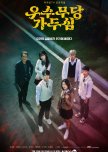
Teen Spirit With A Shaman Twist…
Let’s be honest. The Great Shaman Ga Doo Shim’ is a verbatim title. ( As there’s not a lot left to the imagination to work out what this drama is about.) Admittedly Park Ho Jin’s drama doesn’t try to brand itself as “ the next Goblin ” or a “ new fantasy phenomenon”. It is a teen “ cutesy” fantasy tale about the supernatural, but often leans more into the realm of “teen angst” with main leads Ga Doo Shim ( Kim Sae Ron) and fellow classmate Na Woo Soo( Nam Da Reum) ‘s journey through high school also. (At the time of writing director Park’s wish for a sequel season to explore more about the characters was confirmed also .)
As a consequence the drama featured an array of intriguing characters. However their ultimate contribution to the storyline and depth admittedly does vary dependent on screen time and the screenwriting also. Kim Sae Ron was fairly dynamic as quiet and mysterious high-schooler Ga Doo Shim. The former child actress carried an ambience of perfect angst, suaveness and longing which was perfectly matched for her role . As a character it was evident that Doo Shim could’ve gone down two possible routes; one-dimensional and unlikeable by being egotistical , or a more well-rounded heroine who has a likeable charm by struggling with her emotions and carrying empathy. ( Fortunately with our female lead it was the former case. )
Doo Shim’s character development was arguably the most pivotal from begrudgingly accepting that she can see ghosts and trying to be “ normal” , to opening up to new friends ( particularly Na Woo Soo) , feelings and understanding that she can use her powers for the greater good. Yet whilst her setbacks do help to make her feel realistically flawed, there are moments surrounding Doo Shim which felt like more of an excuse to “ heighten dramatic tension ” rather develop her character gradually or focus more time upon making Doo Shim feel realistic.
For example whilst Doo Shim’s relationship with her mother Hyo Shim( Bae Hae Seon) did see the typical rocky road between a parent and a daughter, there was a lot of missed opportunities to explore more about their complex bond . It was evident how much Hyo Shim genuinely cared for her daughter, however, Doo Shim and Hyo Shim rarely had opportunities outside of necessary plot to talk about their shared bereavement , feelings or emotions without queuing into comic relief or angst. Perhaps with a sequel season it is wrong to condemn a final verdict over this relationship as “ poorly-written” overall, however, hopefully season two will give more chances to covering this relationship rather than putting it on the back burner.
Then of course there’s our main male lead Na Woo Soo. Nam Da Reum did a great job as the plucky prodigy with a heart of gold . Initially starting off as a plot device in order to awaken Doo Shim’s “ character growth and feelings”, it was refreshing to see Woo Soo leave the realm as the prosaic potential “love interest” and the “ sidekick who is new to this world” to having more complex depth . One particular focal point to exploring Da Reum’s greater sense of altruism as a character came through his unusual friendship with underdog and best friend Kim Il Nam ( Yoon Jung Hoon). However this is also where we hit a major rut with Woo Soo as a character; he displays emotions, but he rarely acts out upon them unless they’re necessary to the storyline.
There was brimming potential to explore a lot more about Woo Soo’s darker side which he did display at points in the drama such as his silent threat to Jo Soo Jung ( Lee Ji Won) after her potential blackmail, as well as his anger at Kim II Nam during the main events of the storyline. When the story covered the major events surrounding Kim II Nam it seemed odd the drama switched Woo Soo’s personality towards being “ mopey yet calm” rather than using this as a golden opportunity to explore more about Woo Soo’s own negative feelings or hero complex, as well as heal the wound between Woo Soo and Doo Shim helping one another through these events.
Yoo Sun Ho’s performance as witty dead high schooler Hyun Soo was pretty delightful. As a character Hyun Soo serves both as an example of surprising comical foil as well as wasted potential also. On one side whilst Hyun Soo does have his more brief yet bittersweet moments surrounding his death and his search for his mother, he did often cool down more heavy scenes with deadpan expressions or annoying Doo Shim. However there was a lot of unexplored ground with Hyun Soo’s sentience in the series such as being a ghost, never being able to physically age( unlike Doo Shim or Woo Soo), his search for his mother as well as a lack of deep connection between himself and Doo Shim ( who she seems to have grown up with pretty much ) which were never explored and left anticlimactic with the way the drama abruptly ended l his character arc early on .
This moves us onto the antagonistic force of the drama. Now officially there are two antagonists in the drama; the malevolent sprit, and of course an “ unforeseen” antagonist ( until they were revealed after a major incident). Positively this did present more multi-layered complexity than the entity merely being the “ big bad”, as well as pointing out a clear sociocultural criticism towards the cruel “ dog eat dog” hierarchy in the South-Korean education system . On the other whilst their motive was clear and had the potential to be realistically intriguing , their actual reason covered textbook moustache-villainy rather than being given more intrinsic depth. The ending was ( unsurprisingly) fairly anti climatic- not bad per say and certainly helping to add a more conclusive ending for our antagonists, as well as a. interpretative finale for our main leads but nevertheless slightly rushed with the climax coming to a halt early on, rather than being built up or allowing time for rising tension.
So is ‘ The Great Shaman Ga Doo Shim’ actually worth watching? Park Ho Jin does a good job at building up our main characters as endearing and likeable leads which are further sold by dynamic performances with Kim Sae Ron and of course Hyun Soo, as well as the mystical and supernatural lore of the drama. On the other hand whilst Ho Jin’s potential sequel season could give room for tying up loose ends and problems ( including exploring character depth and relationships which sometimes felt disregarded), there were several inconclusive screenwriting moments which often felt rushed, cliche, one-dimensional or anticlimactic . Overall ‘ The Great Shaman Ga Doo Shim’ certainly remains one of the stronger fantasy drama contenders for 2021 - it is not flawless from a screenwriting perspective and there’s a lot of ground that Ho Jin needs to cover going on forward, but a fairly easygoing watch.
Was this review helpful to you?
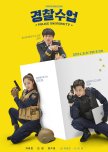
Does ‘Police Academy’ Need To Be Interrogated In Room 101?…
‘ Police Academy’ is a fairly lighthearted approach to the “detective and crime” genre- sweet and surprisingly heartfelt in parts, comical in other scenes and undeniably with more irritating flaws also . So this leaves the ultimate question; is ‘ Police Academy’ worth watching?
The acting front is solid enough here. There are a few slip-ups when long dialogue pauses or line deliverances felt a little mismatched against foregrounded scenes, but Jung Jin Young certainly exceeded expectations as main lead Sun Ho. The idol actor added a level of angsty-sweetness to his onscreen persona .
Sun Ho was a subverted example of the “ main lead with a tragic past”. He didn’t follow the stereotypical routes taken in fiction of being jaded, arrogant or the “ apathetic prodigy” but a fairly normal and confused teen. There were some surprisingly touching scenes ( never to be explored or seen again ) with surrogate father figure Yoon Taek II ( Oh Man Seok) as well as his fraternal-style relationship with best friend Yoon Seung Bum( Choi Woo Sung) helped to foreground some functionality within Sun Ho’s everyday life. However for our main character to befriend fairly positive influences such as Seung Beum and deal with a pretty austere paternal figure such as Yoon Taek this ultimately begs the question; “Why and how did Sun Ho learn to hack and get involved with the authorities ? “ There’s the argument by some viewers that " it is a take your brain out comedy" and “ Sun Ho did so because he was bored”", however, the show never really tied this major point concisely. Perhaps it wouldn’t be too bad if the drama hadn’t carried this over more as an important role in later episodes with sporadic and partially-inaccurate terminology and tech setups , only adding to the confusion as to Sun Ho’s involvement in this world .
This then leads us to talking about his “reasons” for training to become a police officer . A character doesn’t always necessarily have to go down the “ vengeance backstory” route, but it was an odd move that the drama didn’t interlink or at least explore more about Sun Ho’s backstory, his parents as well as some sense of relief and poetic justice for Sun Ho’s goal to become an officer . Aside from the prosaic reasoning in the show that “ the girl I like is pretty and can fight , I want to have a goal and follow her too.”
On this subject there’s evidently also the problem revolving around Kang Hee. Idol actress Krystal isn’t too bad here. This is admittedly not one of her most captivating performances, but not unwatchable either. Our female lead Kang Hee is a bit of a mixed-bag. Despite being Sun Ho’s "dream girl", Kang Hee does have a more evident character drive than Sun Ho in parts. Her mother is far from being a good citizen and Kang Hee has often put academic pressure on herself to succeed in order stray away from being labelled as her “mother’s daughter”. ( A relationship which was given a patchwork happy redemption arc later on without a lot of explanation)However here’s where we hit a major rut with Kang Hee; she isn’t a likeable character.
Of course we are supposed to like her in theory . She’s intelligent, a talented fighter and witty. However the problem with the female lead is that whilst she does have a ‘’complicated ‘’ past which helps to explain some of her motives, she never seems to learn to grow, accept or develop. Perhaps it wouldn’t be too bad if the show pointed this out or made Kang Hee mature by accepting her own mistakes or begrudgingly understanding the errors of her ways, but sadly Kang Hee rarely escaped her one-dimensional character depth throughout the drama.
Then there’s the potential ‘’ onscreen relationship’’ between Kang Hee and Sun Ho. The setup itself is simple enough; Kang Hee is Sun Ho’s crush and his raison d’être. The female lead has rarely noticed Sun Ho up until the storyline of the series, but this soon changes when events begin to unfold. It’s a straightforward enough concept and whilst Krystal and Jin Young’s onscreen chemistry was decent enough, the relationship often hit a rut due to a lack of definitive development as well as hitting an anticlimactic conclusion.
Meanwhile away from the problematic romance factor of the drama there’s then the topic to discuss about Yoo Dong Man ( Cha Tae Hyun) also. Aside from serious questions being raised about how Dong Man wasn’t picked up by any of his colleagues for his initial attitude to Sun Ho, Dong Man is your typical seemingly “ gruff and arrogant cop with a heart of gold”. It was evident that the drama would go down the route of exploring Dong Man’s gradual buddy friendship with the male lead and it was undeniably sweet. On the other hand there was lot left in the air about exploring more complicated depth with Dong Man’s character; his past, rivalry, rookie days and his own complicated feelings when the antagonist is revealed in their midst was often left as unexplored territory.
The antagonist(s) and “climatic tension” of the drama were fairly predictable- not bad per say, but simply existing for the sake of “ plot drive” rather than being given depth or more prominence. As a consequence the ending was quite anticlimactic. Sweet and on a happier note than possibly viewers were anticipating but nonetheless cliche and slightly disappointing.
Whilst ‘ Police Academy’ did offer some enjoyment through its impressive cast lineup and style, the drama’s ability to tackle character writing, depth and plot tension and climatic build seemed sporadically thrown together and lacklustre often resulting in anti climatic solutions or endings . Overall ‘ Police Academy’ was mediocrity at its best- okay if you’re watching just out of boredom and not bothered about writing during a binge-watching session but those looking for a drama with an enjoyable police buddy element and depth may want to look elsewhere.
Was this review helpful to you?

Enjiya ( 演じ屋);The Bittersweet Revenge Tale…
Revenge tales have long been the creme de la creme of classic drama storylines , however, “Enjiya” attempts to revamp this classic setup with our main lead Tomoki ( Isomura Hayato)’s own dish of revenge best served cold . Falsely accused of sexual assault on a train by a stranger ( Ito Momoka) and her accomplice ( Ito Asahi), Tomoki finds his life turned upside down by losing his fiancée ( Tokunaga Eri) and his job overnight. Tomoki journeys to a rooftop in order to commit suicide, only to be a witness to an “enjiya” ( the namesake of the drama); a staged event where clients can request anything they want for a pricey fee. Tomoki decides to employ the services of a mysterious enjiya worker Aika ( Nao) in order to inflict revenge upon all those who falsely accused him of this wrongdoing .
There was a lot of uncertainty where PD Noguchi Teruo ( as the screenwriter and director) was initially going to take “ Enjiya”. Revenge tropes revolving around the lead as a “ wronged person” popularly take form in getting revenge against a lover or ex often over other setups, so seeing a drama where the male main lead was more focused upon his revenge against a set-group of individuals( including strangers) than a lover per say definitely made this a different, yet intriguing watch. The drama flits between soap-opera-style setups (such as when a distraught Tomoki discovers his fiancée’s boyfriend) and of course dark satire and comedy ( Tomoki’s awkward discovery that the seemingly stabbed woman, Aika, is actually acting for a client in a disturbing and lewd fantasy).
Yet the vitality of this setup would undeniably not have come to life without its main cast. Whilst Isomura Hayato is often an overlooked actor by respectfully starring in lesser-known dramas/productions or side roles, he really shone through onscreen as Tomoki. The actor’s donned sloppy haircut, anxiety and mix of emotions present in his facial features captivated Tomoki’s character, emotions and psyche perfectly. Parallel to Isomura was evidently actress Nao who played suave and mysterious enjiya worker Aika. Similar to her costar , Nao has often played in lesser-known works or in smaller roles over the years, yet her performance here was undeniably one of the main highlights of the drama also.
As far as the rest of the casting choices are concerned, the acting is a bit of a mixed-bag respectfully. This isn’t to say it was unwatchable or dragging down any of the other actors, but some performances were admittedly better than others during certain moments of tension or angst . Adding onto this was also Noguchi Teruo’s screenwriting logic also. The screenwriter and director has respectfully suffered from this problem and mixed-criticism for this exact reason in the past and it is evident to see where problems arise here; the logic of characters, as well as realistic scenarios were fairly hare-brained at the best of the times. Actions of characters could sometimes feel lacklustre or out of place by failing to build-up more complexity. Then of course there’s the issue with minor details. This was shown such as with the train seemingly having few mentions of CCTV footage ( and even if was obscured and misinterpreted why it wasn’t covered in more detail), the criminal records of Tomoki’s accusers not coming under fire at least once in the police questioning and of course the fact that Tomoki seemed to have “ no one to lean on” ( not even mentions of friends or family) after the incident also.
However even amongst its more evident mistakes and it’s surreal premise the drama wasn’t afraid to try to tackle trickier subject areas and topics . The prominent premise of the drama itself revolves around the illicit and unusual trend in Japanese culture of unique businesses which accommodate themselves to the unusual services of their clients. This can range from customers looking for a romantic love interest, friend , a confidant, maid and even a fake family member for various reasons and often for extortionate prices. Consequently Teruo’s drama offers a surprisingly dark reflection upon modern Japanese culture and isn’t afraid to pack a punch when needed.
The ending offers a classic case of a dish of revenge best served cold- it’s bittersweet but a concise ending to the story. Overall ‘ Enjiya’ can easily be overlooked by many due to fuzzy camera quality and set designs often coming across outdated and marks of a novice filmmaker, however, the storyline was oddly intriguing . Whilst certain characters ( including our antagonists) could’ve done with more development and build-up, the story offered an engaging take on the revenge trope. A surprisingly good watch.
Was this review helpful to you?
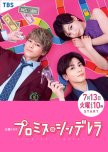
Does The Glass Slipper Fit?
Ah, the “ Cinderella-Tale”. It’s the trope which embodied the ‘ Hana Yori Dango’ franchise, 2000s rom coms and 1990s shoujos countless others beforehand , where the outcast or plucky mundane heroine changes the spiteful, rich male lead ‘s life before he whisks her away to live happily ever after. The trope nearly defined the zenith of 2000s romance dramas, yet nowadays the “ Cinderella Tale” archetype is often seen as being retrospectively outdated . Now the trope comes to life once more with “ Promised Cinderella” but just how does this cliche actually play out in 2021? Is it a nostalgic trip about the old days of romance dramas , or is it just too outdated for its own good?
At its heart “ Promised Cinderella” is based upon the Josei ( aimed for older teens to women) manga of the same-name. It is a trope-worthy love story between 27 year-old Katsuragi Hayame ( Nikaido Fumi), a vagrant former-housewife and rich and pugnacious 17 year-old Kataoka Issei( Maeda Gordon) who Hayame is forced to move in with. However whilst Issei finds his feelings growing for his senior, Hayame finds herself torn between Issei and his seemingly kindhearted brother Kataoka Seigo ( Iwata Takanori) , leading to all the imagined twists and turns out of a love triangle setup.
The drama is undeniably lighthearted, with a more mature and serious heroine taking central position in the drama and also taking off that burdensome worry of labyrinthine plot line . Overacting was sometimes an undeniable problem here, but nonetheless the main cast were dynamic . Nikaido Fumi really embodied Hayame to life onscreen through her performance, en par with fellow costar Maeda Gordon as foul-mouthed high schooler Issei and evidently Iwata Takanori as Issei’s brother Seigo.
Yet is is impossible to turn a blind eye towards the numerous problems amounting in this drama towards Hayame’s “potential love interests”. As far as the main couple goes let’s not sugarcoat it. Hayame is a 27 year- old woman and Issei is a seventeen year- old kid. Understandably the drama has never established anything lewd between the two aside from Issei’s crush and of course age gaps can be shown in numerous and versatile ways. However when tackling the subject of age or generational gaps, a topic which admittedly does come up is how this can impact a relationship between lovers socially, culturally and psychologically.
The drama plays repeatedly upon the gag that Hayame is an “ old woman” ( despite only being 27) but rarely does it draw onto the more significant factors of this age difference for both parties. Issei is incredibly immature for his age. There is the argument that a lot of his conducted attitude is based upon his experiences and whilst we do get to see his character grow at times, he was the typical “ spoilt and insolent brat” archetype. He nearly constantly put Hayame down verbally by passing remarks even in social situations, whilst irksomely Hayame ( despite being 10 years his senior and with more life and relationship experience) seeming “ wittiness” would be thrown out the window in order to keep this lacklustre charade moving as part of the plot device.
Then of course there’s Hayame’s “ potential chemistry” with Seigo. Despite being the older brother of Issei , Seigo has his own dirty secrets which can flare up a nasty side to a seemingly “sweet as pie” trope character. Undeniably intriguing to watch this character unravel, but nevertheless it made it troublesome for viewers to truly root for a respectful and flawed yet likeable character in this drama. Seigo’s “ infatuation ” with Hayame without respecting boundaries sometimes or his own brother’s feelings could verge upon obsessiveness . Perhaps this problem wouldn’t have been so bad if the drama had noted or brought to light that Seigo’s actions were unhealthy or wrong but rarely was this brought up and instead often passed on as “ just fascination” . In a setup where both characters are supposed to be flawed but have their own unintentional screenwriting problems, it is hard to truly root for either main lead. ( Without the lingering thought that Hayame is nothing more than a plot device to keep this lacklustre potential romance “ more dynamic”. )
To make matters worse aside from the questionable relationships in this drama, ‘ Promise Cinderella’ pretty much ticks all the boxes of every romantic cliche that you’ve seen and done before a million times;
1)The jerk former husband who abandons his wife, and isn’t necessary to the storyline pretty much ever again? Check.
2. The female lead who is too prideful to bother actually looking for a job to get off the streets, but no because it gets in the way of the actual reason to be saved by a high schooler? Check.
2)Trying to cover for a “ divorce background” with her husband in order to pair off Hayame with the potential love interests, yet never actually covering legal matters or court processes because it is too much like adding something realistic to the drama? Double Check.
3)Introducing the crude, teen male lead with an inferiority complex and who has a reason for being rude but none of them justify his bratty actions, or allow an opportunity for Issei to issue an actual apology to anyone? Triple Check.
4. Subverting the entirety of the female lead’s strong willed personality in order to make her cutesy to the plot but then changing her again, and then making her docile once more ? Quadruple Check.
‘ Promised Cinderella’ isn’t entirely a bad drama per say. It was pure sickly sweetness in all its glory with an ending which goes down an expected route. The acting was solid and an older female lead adds an intriguing dynamic to the storyline with her potential love interests, however, at the same time, the storyline was often predictable and dull by not even attempting to play or add anything new to the screenplay setup . The relationship between the two main leads and the controversial age gap raised red flags for all the wrong reasons without even trying to present this gradually , and the fact the drama itself wasn’t entirely sure how to incorporate Hayame’s character or revamp the “ Bad Boy” trope with Issei made ‘ Promised Cinderella’ an undeniable guilty-pleasure , but a 2000s-style revamp which feels more out of time than a nostalgic trip down drama lane.
Was this review helpful to you?
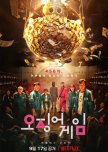
The Mad Pastel Infused Survival World Of Hwang Dong Hyuk…
Hwang Dong Hyuk’s’ Squid Game’ is a world where the corruption of capitalism and moral decadence takes allegorical form in the vivid pastel hues of the game arenas.
The “ fight to survival” genre is nothing new in the world of dramas. ‘ Squid Game’ itself comes off as a weird fusion between ‘ Liar Game’ (with the unusual twist of South Korean childhood games) joined together with the blood-stained violence of ‘ Battle Royale’. However the series isn’t without its own unique twists. Even before stepping into the nightmare-fuelled pastel world of Dong Hyuk’s ‘ Squid Game’ prominent messages about South-Korean society from social prejudice, xenophobia, racism, sexism, misogyny and hypocrisy litter their way onscreen.
Actor Lee Jung Jae could vary between overacting with certain line deliverances, as well as oddly heartfelt as main character Ki Hoon . Ki Hoon has hit an all-time-low in life and spends his time between struggling to get out of debt, avoid gangsters and get time to spend with his daughter. When Ki Hoon is given the chance to participate in the game for ₩45.6 billion by Gong Yoo’s brief cameo as the mysterious and suave diplomat for the games , he soon runs in with childhood friend Sang Woo ( Park Hae Soo) and believes the opportunity to compete to be too good to be true. However Ki Hoon is given a new perspective upon life through games and his seeming amorality becomes replaced by feelings of remorse and guilt towards his past actions.
As the series progresses the series reveals that many of Ki Hoon’s competitors (and even the game guards) have their own personal moments of flaws, strengths and ulterior motives for being involved in the game. Ki Hoon’s old childhood friend Sang Woo ( Park Hae Soo) stands miles apart in Ki Hoon’s eyes initially as an alumni of Seoul National University ( one of the top South Korean universities) due to being an intelligent as well as an analytical individual. However Sang Woo has his own reasons for joining the game due to being heavy in debt as well as his risky bets. Alongside Sang Woo and Ki Hoon is kindhearted immigrant Ali ( Anupam Tripathi) who feels indebted to Sang Woo in particular after helping him countless times, however, Ali hides his own reasons for joining the game also. Together their last close ally is an elderly gentleman No.1 ( Oh Young Soo) who despite seemingly joining the game as a death warrant for his illness, No.1 has a lot more to him as a character than initially meets the eye.
Alongside our main team is seemingly merciless North-Korean defector Kang Sae Byeok ( Jung Ho Yeon), violent gangster Jang Deok Soo( Heo Sung Tae), the foul-mouthed and vocal Han Mi Nyeo ( Kim Joo Ryoung) and sardonic outcast ( introduced not until later episodes) Ji Yeong ( Lee Yoo Mi).
Aside from the actual players there is also police detective Hwang Jun Ho ( Wi Ha Joon) who infiltrates the games as a guard in hope of finding the fate or whereabouts of his missing brother. There were many unexpected twists and turns with characters which will certainly keeps viewers on their feet.
However after the halfway point the screenwriting of ‘ Squid Game’ undeniably hit a slight rut. It wasn’t particularly that suddenly the drama felt slow-placed or lacked logic, but there were multiple occasions where plot moments often felt unexplained or lacked more depth. For example there is a brief subplot involving illegal organ donations of deceased players which whilst wrapped up quickly, questioned a lot about how the guards had established this trade for so long behind the frontman( the head honcho)’s back. Additionally there’s also greater questions about the guards and how they became involved, the VIPS ( aside from some questionable acting), how no one has ratted the existence of the games out and ultimately whether the game operators keep tabs on the surviving winner.
However the drama was undeniably quite profound and heartfelt at times . It wasn’t afraid to present the destruction of childhood and the dog-eat-dog world of South-Korean society. Whilst there were some flaws with the series failing to wrap up certain storylines or character arcs, the cinematography of director Hwang Dong Hyuk’s visionary setting is subtle towards more prominent messages, foreshadowing and hints towards the fate and motives of characters.The OST is composed wonderfully by Jung Jae Il who combines original pieces for the series with traditional Korean and orchestra instruments to create an emotional ambience during scenes. In addition to original pieces several classical music pieces were included with one of the most subtle homages being paid through ‘An der schönen, blauen Donau Op. 134 (Johan Strauss II)’ during several scenes. ( For those who don’t know this piece was also used in the controversial game-changer to the survival game genre, the 2000 Japanese movie ‘ Battle Royale’, which helped to inspire the series and is likely a nod and a wink to the film.) The acting front was admittedly a little wobbly at times but fairly good otherwise . Overall ‘ Squid Game’ is a fairly entertaining watch with prominent messages, intriguing characters and twists which will keep you on the edge of your seats. It is not one for the lighthearted.
Was this review helpful to you?






















